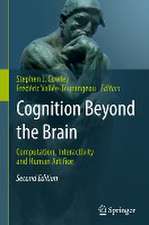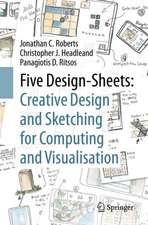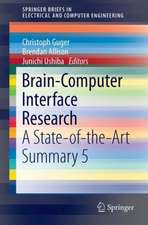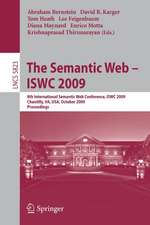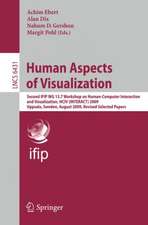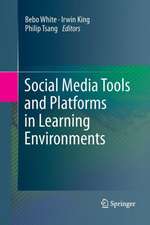Cognition, Communication and Interaction: Transdisciplinary Perspectives on Interactive Technology: Human–Computer Interaction Series
Editat de Satinder P. Gillen Limba Engleză Paperback – 28 oct 2010
In this book examination of these capacities is embedded in understanding the following foundations for design: concepts of “communication and interaction” and their application (Part 1); conceptions of “knowledge and cognition” (Part 2); the role of aesthetics and ethics in design (Part 3).
| Toate formatele și edițiile | Preț | Express |
|---|---|---|
| Paperback (1) | 661.14 lei 6-8 săpt. | |
| SPRINGER LONDON – 28 oct 2010 | 661.14 lei 6-8 săpt. | |
| Hardback (1) | 667.89 lei 6-8 săpt. | |
| SPRINGER LONDON – 2 oct 2007 | 667.89 lei 6-8 săpt. |
Din seria Human–Computer Interaction Series
- 20%
 Preț: 655.85 lei
Preț: 655.85 lei - 20%
 Preț: 309.25 lei
Preț: 309.25 lei - 20%
 Preț: 375.54 lei
Preț: 375.54 lei - 20%
 Preț: 644.48 lei
Preț: 644.48 lei - 20%
 Preț: 667.75 lei
Preț: 667.75 lei - 20%
 Preț: 664.44 lei
Preț: 664.44 lei - 20%
 Preț: 1164.84 lei
Preț: 1164.84 lei - 20%
 Preț: 817.55 lei
Preț: 817.55 lei - 20%
 Preț: 657.16 lei
Preț: 657.16 lei - 20%
 Preț: 645.31 lei
Preț: 645.31 lei - 20%
 Preț: 938.66 lei
Preț: 938.66 lei - 15%
 Preț: 658.05 lei
Preț: 658.05 lei - 20%
 Preț: 822.51 lei
Preț: 822.51 lei - 20%
 Preț: 654.21 lei
Preț: 654.21 lei - 20%
 Preț: 994.26 lei
Preț: 994.26 lei - 20%
 Preț: 1621.89 lei
Preț: 1621.89 lei - 20%
 Preț: 991.60 lei
Preț: 991.60 lei - 20%
 Preț: 783.45 lei
Preț: 783.45 lei - 20%
 Preț: 1175.42 lei
Preț: 1175.42 lei - 20%
 Preț: 659.97 lei
Preț: 659.97 lei - 20%
 Preț: 219.15 lei
Preț: 219.15 lei - 20%
 Preț: 334.86 lei
Preț: 334.86 lei - 20%
 Preț: 969.84 lei
Preț: 969.84 lei - 20%
 Preț: 642.19 lei
Preț: 642.19 lei - 20%
 Preț: 314.39 lei
Preț: 314.39 lei - 20%
 Preț: 995.89 lei
Preț: 995.89 lei - 20%
 Preț: 752.58 lei
Preț: 752.58 lei - 20%
 Preț: 990.30 lei
Preț: 990.30 lei - 20%
 Preț: 990.12 lei
Preț: 990.12 lei - 20%
 Preț: 336.21 lei
Preț: 336.21 lei - 20%
 Preț: 334.71 lei
Preț: 334.71 lei - 20%
 Preț: 312.62 lei
Preț: 312.62 lei - 20%
 Preț: 994.92 lei
Preț: 994.92 lei - 20%
 Preț: 331.74 lei
Preț: 331.74 lei - 20%
 Preț: 646.80 lei
Preț: 646.80 lei - 20%
 Preț: 334.86 lei
Preț: 334.86 lei - 20%
 Preț: 994.40 lei
Preț: 994.40 lei - 20%
 Preț: 329.76 lei
Preț: 329.76 lei - 20%
 Preț: 332.24 lei
Preț: 332.24 lei - 20%
 Preț: 992.11 lei
Preț: 992.11 lei - 20%
 Preț: 650.40 lei
Preț: 650.40 lei - 20%
 Preț: 337.00 lei
Preț: 337.00 lei - 20%
 Preț: 332.39 lei
Preț: 332.39 lei - 20%
 Preț: 1279.86 lei
Preț: 1279.86 lei - 15%
 Preț: 636.12 lei
Preț: 636.12 lei - 20%
 Preț: 336.67 lei
Preț: 336.67 lei - 20%
 Preț: 1000.70 lei
Preț: 1000.70 lei - 20%
 Preț: 645.14 lei
Preț: 645.14 lei
Preț: 661.14 lei
Preț vechi: 826.42 lei
-20% Nou
Puncte Express: 992
Preț estimativ în valută:
126.51€ • 132.44$ • 104.68£
126.51€ • 132.44$ • 104.68£
Carte tipărită la comandă
Livrare economică 05-19 aprilie
Preluare comenzi: 021 569.72.76
Specificații
ISBN-13: 9781849966795
ISBN-10: 1849966796
Pagini: 616
Ilustrații: XXIV, 592 p.
Dimensiuni: 155 x 235 x 32 mm
Greutate: 0.85 kg
Ediția:Softcover reprint of hardcover 1st ed. 2008
Editura: SPRINGER LONDON
Colecția Springer
Seria Human–Computer Interaction Series
Locul publicării:London, United Kingdom
ISBN-10: 1849966796
Pagini: 616
Ilustrații: XXIV, 592 p.
Dimensiuni: 155 x 235 x 32 mm
Greutate: 0.85 kg
Ediția:Softcover reprint of hardcover 1st ed. 2008
Editura: SPRINGER LONDON
Colecția Springer
Seria Human–Computer Interaction Series
Locul publicării:London, United Kingdom
Public țintă
ResearchCuprins
Communication and Interaction.- Knowledge as Embodied Performance.- Cognitive Technology - Technological Cognition.- Knowledge in co-action: social intelligence in collaborative design activity.- Degrees of engagement in interactive workspaces.- The nature of virtual communities.- ‘Use’ Discourses in System Development: Can Communication Be Improved?.- A Pattern Approach to Interaction Design.- CSCW Design Reconceptualised Through Science Studies.- Designing for Work Place Learning.- The narrative aspect of scenario building - How story telling may give people a memory of the future.- Narration, discourse and dialogue: issues in the management of inter-cultural innovation.- Rethinking the Interaction Architecture.- Towards a General Theory of the Artificial.- Knowledge and Cognition.- The Socratic and Platonic Basis of Cognitivism.- Cockpit Cognition: Education, the Military and Cognitive Engineering.- Two Legs, Thing Using and Talking: The Origins of the Creative Engineering Mind.- Rule Following and Tacit Knowledge.- Seeing and Seeing-AS.- The Practice of the Use of Computers.- The Contribution of Tacit Knowledge to Innovation.- The Nurse As An Engineer.- The Role of “Craft Language” in Learning “Waza”.- Building a pedagogy around action and emotion: experiences of Blind Opera of Kolkata.- Aesthetics, Ethics, and Design.- Ethics and Intellectual Structures.- Organisational Spaces and Intelligent Machines: A Metaphorical Approach to Ethics.- On Human-Machine Symbiosis.- What Goes on When a Designer Thinks?.- Multimedia Archiving of Technological Change in a Traditional Creative Industry: A Case Study of the Dhokra Artisans of Bankura, West Bengal.- Databases are Us.- Leonardo’s choice: the ethics of artists working with genetic technologies.- Poetics ofperformative space.- Ethics is Fragile, Goodness is Not.
Textul de pe ultima copertă
Cognition, Communication and Interaction examines the theoretical and methodological research issues that underlie the design and use of interactive technology. Present interactive designs are addressing the multi-modality of human interaction and the multi-sensory dimension of how we engage with each other. This book aims to provide a trans-disciplinary research framework and methodology for interaction design. The analysis directs attention to three human capacities that our engagement with interactive technology has made salient and open to constant redefinition. These capacities are human cognition, communication and interaction.
In this book examination of these capacities is embedded in understanding the following foundations for design: concepts of “communication and interaction” and their application (Part 1); conceptions of “knowledge and cognition” (Part 2); the role of aesthetics and ethics in design (Part 3).
In this book examination of these capacities is embedded in understanding the following foundations for design: concepts of “communication and interaction” and their application (Part 1); conceptions of “knowledge and cognition” (Part 2); the role of aesthetics and ethics in design (Part 3).
Caracteristici
A new direction of research in interactive technologies, bringing together cognition, communication and interaction within a unified theoretical framework








